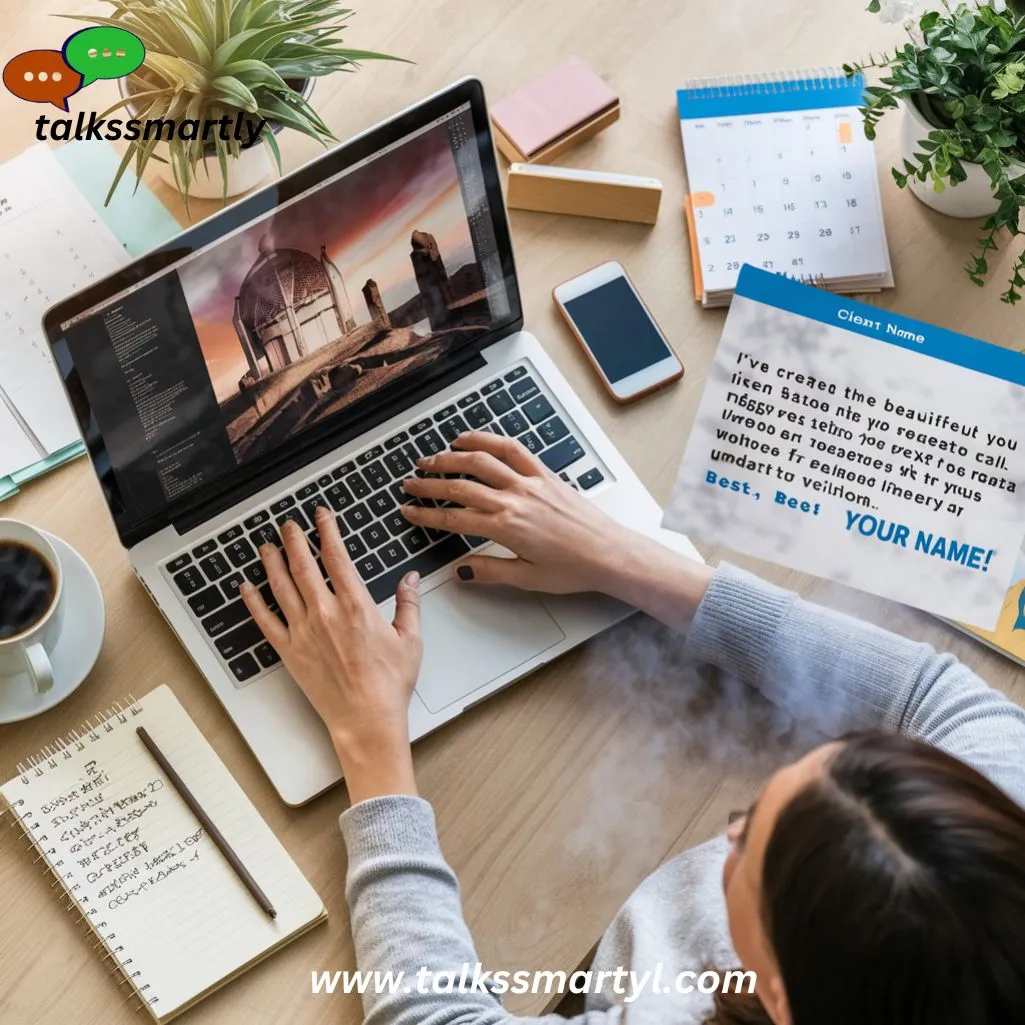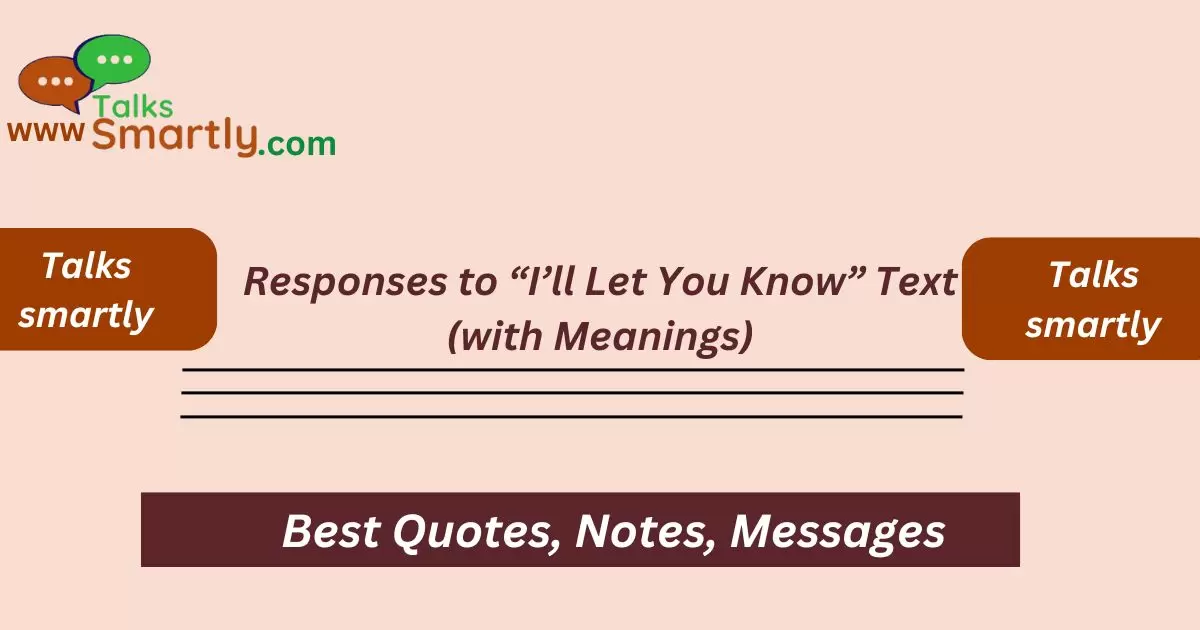Introduction
In this comprehensive guide, explore over 20 responses to the ambiguous text “I’ll let you know,” unraveling the diverse intentions and emotions behind this commonly used phrase in digital conversations.
Curious about the different meanings behind the phrase “I’ll let you know” in text conversations? In this guide, we’ll explore over 20 possible responses to this common message, uncovering the various intentions and emotions they might convey.
Whether it’s a promise for future communication or a polite brush-off, understanding these responses can help decode the subtle nuances of digital communication.
What Does “I’ll Let You Know” Mean?
When someone responds with “I’ll let you know” to a question or proposal, it often leaves the other person wondering about the true intention behind the response. This phrase is commonly used in various contexts, such as making plans, responding to invitations, or providing updates on a situation. However, its ambiguity can sometimes lead to confusion or frustration for the person awaiting a response.
Understanding the Ambiguity
“I’ll let you know” is a phrase that falls into the category of ambiguous responses. It neither confirms nor denies the proposal or question presented to the speaker. Instead, it suggests that the speaker needs more time to consider or gather information before providing a definitive answer. The ambiguity lies in the uncertainty of whether the speaker intends to follow up or simply brush off the matter.
Possible Meanings Behind “I’ll Let You Know”

Consideration and Evaluation:
Example: “Thanks for inviting me to the party. I’ll let you know if I can make it.”
- This response indicates that the person needs to evaluate their schedule or other commitments before committing to attending the event.
Indecision or Uncertainty:
Example: “I’m not sure about the movie tonight. I’ll let you know later.”
- In this context, the person is uncertain about their plans and needs more time to decide.
Avoidance of Commitment:
Example: “Would you like to join us for dinner tomorrow?” “I’ll let you know.”
- Here, the person may be hesitant to commit to the invitation and opts for a vague response to avoid making immediate plans.
Politeness or Tactfulness:

Example: “Can you complete the report by tomorrow?” “I’ll let you know if I can meet the deadline.”
- This response acknowledges the request without making a firm commitment, possibly to avoid disappointing the requester if the deadline cannot be met.
Genuine Intent to Follow Up:
Example: “I’m waiting for confirmation from my manager. I’ll let you know once I have an answer.”
- In some cases, “I’ll let you know” is used genuinely to indicate that the speaker plans to provide an update or response once they have more information.
Delaying Tactic:
Example: “Are you coming to the meeting?” “I’ll let you know.”
- This response may be used as a tactic to delay or avoid giving a direct answer, especially if the person is hesitant or unwilling to attend the meeting.
Responses When Someone Say “You’re Cute
Navigating Responses to “I’ll Let You Know”
When faced with a response like “I’ll let you know,” it’s essential to consider the context and tone of the conversation to gauge the speaker’s intention. While some responses may genuinely indicate a need for more time or information, others could be a polite way of declining or avoiding commitment.
Common Misinterpretations
- Assuming Definitive Agreement:
- It’s easy to misinterpret “I’ll let you know” as a positive response, assuming that the speaker will confirm or agree to the proposal later. However, this may not always be the case, leading to disappointment or confusion if the response is never followed up on.
- Expecting Immediate Confirmation:
- Some individuals may interpret “I’ll let you know” as a promise to provide an immediate response, only to realize later that the speaker meant to follow up at a later time.
Responding to “I’ll Let You Know”
When on the receiving end of “I’ll let you know,” it’s essential to respond appropriately based on the context and your relationship with the speaker. Here are some possible responses:
- Express Patience: Example: “No rush, take your time to decide. I’m here whenever you’re ready.”
- Offer Support: Example: “If you need any help or input to make your decision, feel free to reach out to me.”
- Provide Encouragement: Example: “I’m looking forward to hearing from you whenever you have an update.”
- Clarify Expectations: Example: “Could you please specify how you’ll inform me? Via text, email, or call?”
- Suggest Flexibility: Example: “If things change or you need to reschedule, just let me know. I’m flexible.”
- Express Understanding of Busy Schedules: Example: “I understand if you have a lot going on. Just keep me posted whenever you can.”
- Ask for Confirmation of Receipt: Example: “Could you confirm that you received my message? So I know you got it.”
- Offer a Reminder Option: Example: “Would you like me to check back in with you later, or do you prefer to reach out to me?”
- Provide Contact Information: Example: “Feel free to contact me whenever you’re ready to discuss further. Here’s my number/email.”
- Reiterate Importance of the Matter: Example: “This decision is crucial for our project. Please let me know as soon as possible.”
- Seek Clarity on Decision-Making Process: Example: “Can you give me insight into what factors you’re considering before making a decision?”
- Express Openness to Discussion: Example: “If you want to talk through any concerns or details, I’m available to chat.”
- Offer Assistance in Gathering Information: Example: “If you need any additional data or details, I can provide that to help with your decision.”
- Suggest Setting a Deadline: Example: “Could we set a deadline for when you’ll let me know? It would help me plan accordingly.”
- Reassure Availability for Further Discussion: Example: “If you need to bounce ideas off someone or discuss further, I’m here to help.”
- Ask for Confirmation of Understanding: Example: “Just to confirm, are we on the same page regarding what you’ll let me know?”
- Express Gratitude for Communication: Example: “Thanks for keeping me in the loop. I appreciate your transparency.”
- Seek Agreement on Follow-Up: Example: “Shall we schedule a follow-up meeting to discuss your decision further?”
- Clarify Urgency of Response: Example: “Is there a particular timeframe you’re aiming to let me know by?”
- Offer Multiple Communication Channels: Example: “Feel free to reach out via text, email, or call whenever you have an update.”

- Highlight Impact of Delay: Example: “Delaying this decision might affect our project timeline. Please let me know at your earliest convenience.”
- Express Willingness to Adjust Plans: Example: “If your circumstances change or you need to adjust plans, just give me a heads-up.”
- Suggest Decision Criteria: Example: “Would it help if we establish specific criteria to guide your decision-making process?”
- Offer to Share Decision-Making Responsibility: Example: “If you’re unsure, we can discuss the decision together and come to a mutual agreement.”
- Reiterate Importance of Prompt Communication: Example: “Timely communication is essential for us to move forward. Please keep me updated.”
Conclusion
“I’ll let you know” is a commonly used phrase that can convey various meanings depending on the context and tone of the conversation. While it’s often used as a polite way to defer a decision or commitment, it’s essential to consider the underlying intentions behind the response.
By understanding the potential meanings and navigating responses accordingly, individuals can effectively communicate and manage expectations in various situations.












